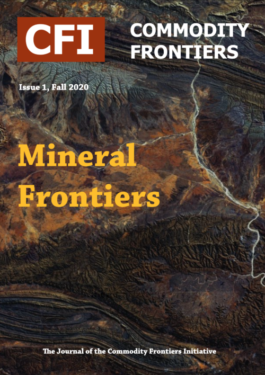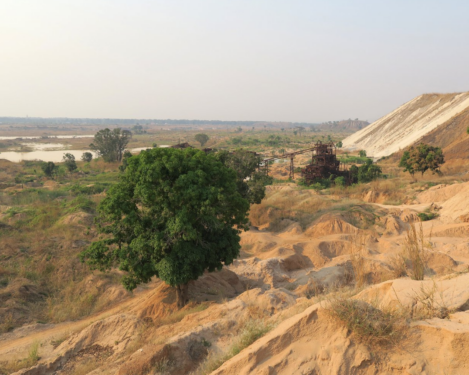Publication
Fall 2020: Commodity Frontiers Journal, online
Capitalism’s commodity frontiers are variously imagined, created, (re)defined, (re)produced, operated, and exploited. They are relocated and shifted, they expand and contract, and they are abandoned. They are colonial, precolonial, and post-colonial. They are places and processes, concrete and abstract. Commodity frontiers include land, labor, ecological, and technological regimes in particular times and places. They are marked by uneven and shifting power relations between state, business, civil society actors, and financial institutions. And they include and express patriarchal and racialized notions, practices, relations, and structures. Commodity frontiers are rife with inequalities, degradations, and resistances.
As an orienting concept, the commodity frontier lens offers both an entry point and an invitation for depth. Descriptively, the concept helps to document the form and content of commodity frontiers and the dynamics of frontier-ization in particular times and places, without losing sight of more general and shared processes. Analytically, the lens opens a space for theorizing embodiments of capitalist expansion, including how ecological “limits” (like soil exhaustion) and social contestations (like revolts and protests) underwrite capitalist transformations and flexibility (like spatial and technological fixes). Pedagogically, the commodity frontier offers a connection point between and among researchers, students, and publics, in university, creative, policy, and advocacy/activist spaces.
Contributions in this issue take up the commodity frontier lens in various ways. They deal with a range of minerals and frontiers: gold (Engels; Verbrugge and Robles Mengoa), copper (Cottyn), coal (Yeni), lithium (Arndt and Gueye; Cariola; Marquez), “green energy” (Arndt and Gueye; Cariola; Vázquez Ruiz), and seabed and ocean floor mining (Menon). More than this, the articles highlight various approaches to the study of, and engagement with, capitalism’s mineral frontiers.
In the opening section, Bettina Engels elaborates the conditions of conflict related to gold mining in Burkina Faso, drawing on her ethnographic research with Kristina Dietz in their GLOCON (Global Change – Local Conflict?) research group. Next, Boris Verbrugge and Maria Eugenia Robles Mengoa discuss conceptual, methodological, ethical, and personal challenges of studying global gold mining, including gendered and racialized experiences during ethnographic fieldwork. In her interview with Anna Zalik, Gayatri Menon’s article turns to the pedagogy of extraction, offering conceptual insights and inspiration for the classroom, and for linking teaching and research.
Explicitly linking past and present, Hanne Cottyn’s article reflects on the “entangled frontiers” of llama herding and copper mining in Bolivia, embedded in histories of capitalism and indigenous resistance, and more recently, in the COVID-19 pandemic. Maria Cariola’s piece centers on an interview with members of the highly interdisciplinary Research Group on Commons and Geopolitics at the University of Buenos Aires in Argentina, whose work coalesces around the politics, experiences, and resistances to lithium frontier expansion.
Julien-François Gerber discusses political and conceptual connections between anti-mining social movements and degrowth, arguing that the two are inexorably linked. Continuing on the theme of conflict and countermovements, Lotte Arndt and Oulimata Gueye’s article introduces the transnational artist’s collaboration, On-Trade-Off, which critically examines extraction, power structures in global capitalism and the global art world, and searches for alternatives. Sithandiwe Yeni’s interview with environmental justice and feminist activist, Pinky Langa, details how the COVID-19 pandemic has impacted women who organize against extractivism in South Africa. And Leonardo Marques reviews two books from 2020 on mining and capitalism, calling for further investigation of how mining changes over time, including in its capitalist forms.
The issue also includes two Op-Eds. Ulbe Bosma, the CFI Coordinator, reflects on the WWF’s “Living Planet Report 2020” and the long history of capitalism. And Alberto Vázquez Ruiz, Project Coordinator of CATAPA (Belgium), discusses the newly announced (29 September 2020) European Raw Materials Alliance (ERMA) as part of the rise of “green imperialism.” Events and Announcements close the issue, with information about relevant workshops, conferences, calls for papers, vacancies, and exhibitions.
Commodity Frontiers is one part of the CFI network and project. Through the pages of this journal, we want to further create and foster community among thinkers and doers who critically engage with commodity frontiers. In these pages we can share perspectives and analyses, data and doubts, reflections and hopes, questions and possible answers. We can exchange ideas, collaborate, and debate. And we can examine the past, while looking to the future.
_
Commodity Frontiers is a biannual open access publication from the network of the Commodity Frontiers Initiative. With thematic focus, each issue of the journal features short articles, conversations with historians, social scientists, and activists about the method and practice of commodity frontier research, announcements of newly published books and articles, and more.
__
Editorial Board
Mindi Schneider, Senior Editor
Editors-in-Chief
Sven Beckert, Ulbe Bosma, Mindi Schneider, Eric Vanhaute
Section Editors
Feature Article – Kristina Dietz, Bettina Engels
Studying Commodity Frontiers – Samuël Coghe, Shaohua Zhan
Teaching Commodity Frontiers – Gayatri A. Menon, Elisabet Rasch
Historians take on the Present – Pim de Zwart, Mamoudou Sy, Simon Jackson
Commodity Frontier Political Ecology – Andrew Curley, Mattias Borg Rasmussen
Conflicts, Frictions, and Counternarratives – Katie Sandwell, Serena Stein
Creative Frontiers – Maarten Vanden Eynde & Marjolijn Dijkman (Enough Room for Space)
From the Field – Hanne Cottyn, Sthandiwe Yeni
Publications – Ernst Langthaler, Rafael Marquese
Op-Eds – Mindi Schneider
Events and Announcements – Claudia Bernardi
__
Commodity Frontiers is the Journal of the Commodity Frontiers Initiative (CFI).

